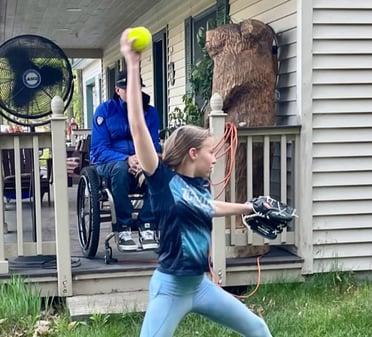Dropped Third Strikes
 There is this rule in softball and baseball: if the catcher drops the third strike and first base is open, or there are two outs, the batter can run to first base. The catcher is supposed to just pop up and tag the batter. Or, they can throw the ball to first and let the first base person tag the batter. The situation is stressful for the pitcher and the catcher, of course, but also for the batter herself. There is just so much to remember at the moment. And our kids are in middle school, so it feels like there is even a bigger delay sometimes on all fronts-- the pitcher, the catcher, and the batter- from the moment when the pitch is dropped to when the batter realizes they can run to the catcher snatching the ball and deciding next steps.
There is this rule in softball and baseball: if the catcher drops the third strike and first base is open, or there are two outs, the batter can run to first base. The catcher is supposed to just pop up and tag the batter. Or, they can throw the ball to first and let the first base person tag the batter. The situation is stressful for the pitcher and the catcher, of course, but also for the batter herself. There is just so much to remember at the moment. And our kids are in middle school, so it feels like there is even a bigger delay sometimes on all fronts-- the pitcher, the catcher, and the batter- from the moment when the pitch is dropped to when the batter realizes they can run to the catcher snatching the ball and deciding next steps.
I am feeling like that singular moment, stretched, maybe even suspended in time-- only all-- the-- time. There is, of course, a lot to remember and/or balance when one works and parents full time. I use Google Calendar and Classroom, and an old-school chalkboard at home in my kitchen to put the weekly schedule up for the rest of the family. The grandparents receive Sunday evening emails about the upcoming week’s game schedules or when potential rides for the children are needed. The balls are often in the air and often do not always reach their targets, but we keep on throwing and catching-- all hope that one of us will be on our game if the other isn’t.
Our daughter is a pitcher, and our son dabbles between catcher and third base. She works hard in the evenings after practice to get better; our son wants to go fishing or ride his bike over to the neighbors, where they build jumps in the woods. Geoff understands the more focused child, despite not knowing anything about pitching a softball. He does understand body movement, even if he’s never thrown an underhanded fastball. I better understand the child who doesn’t want to specialize in any sport or position because there are so many choices in the day. Why would our daughter want to be a competitive ski racer and follow that season by pitching? The pressure seems insurmountable. But she doesn’t see it that way. Neither does her dad.
And I’m generally not a pessimist either, but this spring, right now, all I feel is the weight of missed balls flying by me at home plate. I’m not catching anything, and I can’t tag out any batter when I drop the ball. I’m not hitting any line drives to right field, and I’m sure as hell not striking anyone out. But as I watch Geoff outside, after dinner but before the black flies can carry them away, watching our girl pitch after pitch, I’m reminded of the fact that no inning in youth baseball or softball goes on for days. Eventually, they end, and the other team gets a chance to hit the ball, while everyone else takes the field.
Whether we are battling illness ourselves, helping to care for a loved one, or listening to a friend whose mom doesn’t know her anymore, we just keep getting up at bat, throwing another pitch, or catching the ball---- and maybe we miss. Actually, we miss a lot of the time. Yet, there are friends and fans cheering us on all the while, maybe not in person at the ballfield, but in the form of text messages, funny memes, or actual phone calls.
And in a world full of dropped third strikes, we feel you too.
Join Our Movement
What started as an idea has become a national movement. With your support, we can influence policy and inspire lasting change.
Become an Advocate